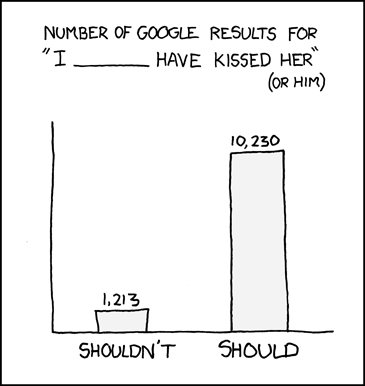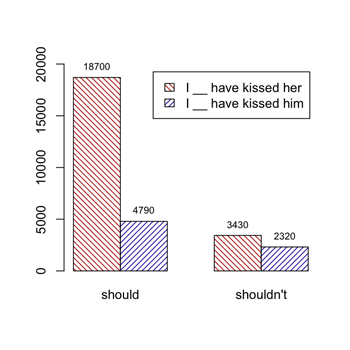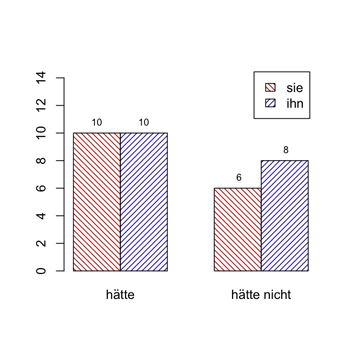Something I missed
« previous post | next post »
Back in August, Anatol Stefanowitsch at Bremer Sprachblog extended xkcd's classic research on the nature of regret by adding the dimension of gender, and by comparing English to German ("Je Ne Regrette Rien", 8/17/2008):
 |
 |
 |
(Click on the images for larger versions.)
Helen Dewitt observed ("regrets I've had a few", 8/20/2008):
Stefanowitsch has revealed several striking disparities between the anglophone and germanophone worlds of sexual regret – or, at least, disparities between the pools of regretful English and German speakers who feel called upon to share their disappointment on the WWW. (Perhaps English-speaking men are likelier than both English-speaking women and German-speaking men AND women to have no alternative to the kindness of strangers.)
Of course, there are some interpretive problems here, not least a version of the observer's paradox, but also the existence of a book and a song entitled "I should have kissed her more", and perhaps some variation in variability. Still, the basic result is one of those things that's too good to check.
Has anyone extended this research to other languages?
Andy J said,
September 19, 2008 @ 9:37 am
Fequently on LL comment is made – quite rightly in my opinion – on the inability of journalists in the face of scientific subjects to accurately distil an academic paper into something the layman can understand. Yet on many other occasions, little or no comment is passed on the suitability of Google as a corpus from which pseudo statistical inferences can be drawn. Anyone who has ever used Google to search for anything knows how subjective the results are. I'm not sure how far into his cheek his tongue was when MYL wrote "Of course, there are some interpretive problems here" but I would be inclined to say that people should really just find something better to do with their time if this is the only way they can think of to support their "research".
Kate said,
September 19, 2008 @ 9:47 am
Andy J, I think there's a difference in the level of light-heartedness…
Am I misreading, or is everyone assuming that those kissing (or regretting not kissing) women are men, and vice versa?
Mark Liberman said,
September 19, 2008 @ 9:51 am
@Andy J: It's a joke, son.
We've covered problems with Google counts many times, starting back in 2003. The promise and peril of web-count data deserves a post or two all its own; but I hope that no one is taking this jocular blog post as serious research report. (Not that blog posts can't present serious research; but this one doesn't.)
Andy J said,
September 19, 2008 @ 10:05 am
@MYL. I'm very glad to hear that. I wasn't a reader of LL back in 2003 and so regretably I missed the post which you referred to. However, leaving aside this specific post, there have been many occasions in LL posts where Google hits have been been served up as pseudo-scientific collateral to support some point or other, so I'm not sure you're completely innocent here! (It's a joke, dad)
Benjamin Zimmer said,
September 19, 2008 @ 10:24 am
We've had plenty of posts warning about relying on Googlecounts since '03 — check the archives. For starters, try these:
Three posts from Mark in Jan. '05: 1, 2, 3
Three posts from me in Nov. '05: 1, 2, 3
Sili said,
September 19, 2008 @ 10:55 am
The results in Danish are too few to do statistic on (only one regret of kissing a guy).
Of course I have no idea how kids these days communicate on the internet. I'm only beginning to use respellings to better approximate the spoken word in txts, myself.
GAC said,
September 19, 2008 @ 11:27 am
For fun (and to see if I can actually translate the phrase correctly):
debía besarlo – 87
no debía besarlo – 9
debía besarla – 1,330 (¡UAU!)
no debía besarla – 9
and for completeness sake
debía besarle – 86
no debía besarle – 4
So, I guess male hispanophones (particularly those without leísmo) have a serious problem with the follow-through :P
If I actually knew how to construct anything this sentence in Chinese, I would do it. I AM FAIL :'(
Thomas Thurman said,
September 19, 2008 @ 12:42 pm
Fe ddylwn i fod wedi'w chusan e – no hits
Fe ddylwn i fod wedi'w gusan e – no hits
Bother.
Thomas Thurman said,
September 19, 2008 @ 12:42 pm
(Okay, it should have been chusan hi, shouldn't it? You can see I'm not a native speaker.)
Garrett Wollman said,
September 19, 2008 @ 11:03 pm
The frustrating thing about comparing ghit ratios and similar measures is that Google actually has both the corpus and the index and could easily answer these sorts of questions if only they provided an interface that bypassed the full user-friendly-Web-search logic and just did the standard phrase-retrieval-using-inverted-index thing.
Jorge said,
September 22, 2008 @ 9:28 am
@GAC "Debía besarlo/a" is "I had (the obligation) to kiss him/her", not "I should have kissed him/her". You want "Debí haberlo/a/e besado" or "Tendría que haberlo/a/e besado"
GAC said,
September 22, 2008 @ 9:11 pm
@Jorge: Thanks. I was pretty sure there was something fatally wrong with what I wrote. I feel kinda bad when I call myself "fluent" in Spanish and then I can't friggin deal with a simple translation.
Stephen Jones said,
September 25, 2008 @ 1:05 am
Google counts can provide perfectly valid data regarding language use, AndyJ's attempt to dismiss them out of hand out of perverted intellectual snobbery notwithstanding.